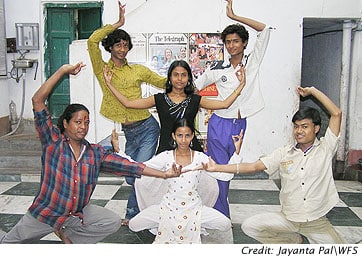
 KOLKATA, India (WOMENSENEWS)–Study hard, finish education and find a job.
KOLKATA, India (WOMENSENEWS)–Study hard, finish education and find a job.
Those were 12-year-old Tanzina Khatun’s rules for life until boys at her school found out that she lived in the red-light area in north Kolkata.
"Once they realized my mother was a sex worker, they started taunting me constantly. Once one of them even snatched my ‘dupatta’ (long stole) and said ‘you will become like your mother, what’s the point in coming to school?’ My mother complained to the teachers but the situation did not change. Even the teachers accused me of provoking the boys," she says.
Tanzina is 17 now and the humiliation still seemed fresh, five years later. She has dropped out of school and is being tutored to become a dancer in the red-light district.
"I have plans to sit for my matriculation privately," she adds.
She joins a large number of students who drop out of secondary school either because they are embarrassed about having parents in sex work or can’t afford tuition, according to a 2010 study commissioned by UNICEF and the Women and Child and Social Welfare Department of the government of West Bengal.
Girls are also often pressured to follow a family tradition of women earning a living by sex work.
"Things remain fine up to the primary level as queries from young children on family backgrounds are limited," says Bharati Dey, 54, program director of the Mahila Samanway Committee, a nongovernmental organization run by the sex workers in Kolkata.
She says problems arise in higher grades when students get more curious and intrusive with one another.
"This often leads to humiliation and a psychological inadequacy amongst children from red-light areas as friends start avoiding or ostracizing them once the truth comes out," Dey says.
Two Rallying Points
Dey says a push to educate the children of sex workers grew out of an STD/HIV intervention program in 1992.
"We realized that empowering the sex workers and their children was essential. Labor rights and education became the two rallying points," Dey says.
The 2010 study surveyed 2,003 children in 1,200 sample families living in red-light areas. Of these, 471 never attended school, 384 stopped going to school in the pre-primary stage, 758 stopped going to school after the primary level and 377 completed secondary level. Only 13 managed to continue until the higher secondary level.
Among students aged 14-18, 101 male teens dropped out of school and 133 female teens dropped out.
"I was increasingly made to feel like an alien by other children in school. They treated me as abnormal just because I belonged to a red-light area," says Loknath Bhattacharya, 20. "I am doing my graduation privately through the Indira Gandhi Open University now. But I realize that any workplace I join will create similar problems."
Researchers found that mothers in the study were keen to give their child an education. Almost all sex workers enroll their children in school.
Mothers themselves enrolled 70 percent of the children while advocacy groups handled the rest.
Joydev Mazumdar is director of the Jayaprakash Institute of Social Change, which conducted the study. He says that student dropout rates rise as their mothers age and their income declines.
The study found that 75 percent of the mothers were single-handedly providing funds for their children’s study materials, while 21 percent were helped by nongovernmental groups.
Customers Overlook Needs
The mothers’ customers, who sometimes father these children, remain insensitive to their needs.
"This indicates the disjointed family structure that these children are subjected to, which adversely affects their personality growth and sense of social esteem," says Mazumdar.
Priya Ghosh, 14, is taking dance classes and resigned to a future in the brothel. "My mother could not pay my school fees, so I had to quit," she recalls.
Sangita Kurmi, 21, made it to middle school but then dropped out to become a sex worker and make a living.
The story is not too different for the boys, many of who wind up as male prostitutes or pimps.
"Many also turn to crime," says Dey. "The humiliation in school, often suffered at the delicate ages of 9 and 10, makes them psychologically dysfunctional. They start thinking that their mothers have no respect, that they themselves have no honor or pride. Crime seems very attractive to them as they are then not answerable to society."
Researchers recommended more vocational training courses for the offspring of sex workers, particularly female adolescents under pressure to earn money. They also suggested community centers for the children with hours of operation that would cover the odd work hours of sex workers.
But only so much can be achieved by sex workers, their children and advocates. The researchers also pleaded for greater sensitivity from school communities–teachers, parents and children–towards the vulnerabilities students.
This article is adapted from one that was released by the Women’s Feature Service. For more articles on women’s issues log on to: http://www.wfsnews.org.
Would you like to Comment but not sure how? Visit our help page at https://womensenews.org/help-making-comments-womens-enews-stories.
Would you like to Send Along a Link of This Story?
https://womensenews.org/story/prostitution-and-trafficking/110613/taunts-derail-sex-workers-kids-in-kolkata
Ajitha Menon is a Kolkata-based senior journalist. She writes on politics, gender and social issues.


